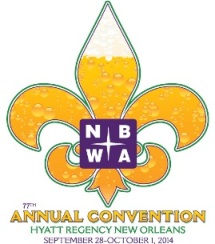
I forget how the rest of that joke goes, but everyone ends up laughing.
That was the scene this morning at the 77th annual National Beer Wholesalers convention, being held in New Orleans, where No-Li Brewing founder John Bryant, Devils Backbone founder Steve Crandall, Lagunitas founder Tony Magee and MillerCoors CEO Tom Long participated in a panel discussion that tackled a variety of industry issues.
The talk, led by Gretz Beer Company president Mike Gretz, featured built-in tension dynamics: the CEO of the country’s second-largest beer supplier was sitting side-by-side with the very same competitors who are cutting into his company’s dwindling market share.
The tension was noticeable. So how to cut it? You come out the gates firing softballs.
“Which person would you most like to have a beer with?” Gretz asked all of the panelists, except for Magee, who was asked a different question.
“So Tony, who would you most like to smoke a joint with?” Gretz asked.
Note to future NBWA moderators: weed jokes, especially when directed at a marijuana-friendly brewery owner, are instant crowd pleasers.
A game Magee pulled out an electronic vaporizer.
“I’d love to get Adolphus Busch high,” he said.
From that high note, the discussion segued to more insightful conversation, with Gretz asking the panelists to comment on franchise laws, distributor consolidation and competition.
“It’s a dog fight,” said Long, referring to the influx of new competitors. “Folks are going to define who they are by who they’re not.”
And just like that, the first craft vs. crafty shot was fired. Long’s remark was a thinly veiled jab at the efforts both craft brewers and the Brewers Association have made to help consumers distinguish between products sold by independently-owned beer companies and larger organizations like MillerCoors.
“The best ones define who they are,” he said.
Magee took a different approach with his response, choosing instead to comment on the efforts being made, by some craft brewers, to create franchise law carve-outs for small producers.
“The whole notion of undoing that is a competitive strategy that I don’t agree with,” he said to applause. “The idea of trying to change the underlying landscape is a foolish diversion from doing what you should be doingÔǪmaking relationships.”
The other craft brewers defended Magee.
“We need the three-tier system,” said Bryant. “If we didn’t have it, No-Li wouldn’t be able to go to market and succeed.”
Bryant advocates for creating clauses in wholesale contracts that create “mutual accountability.”
He elaborated on that idea in a follow-up interview.
“You need mutual accountability, in writing, that allows both parties to assess the strength of the brand and the relationship at the end of the year,” he told Brewbound.
He suggests that craft brewers, instead of spending time on attempting to change franchise laws, work to build out-clauses and performance expectations into their wholesale contracts.
The process of strengthening wholesale partnerships is becoming more difficult as craft brewers continue to flood the market with new offerings — there’s now more than 13,000 beer labels, noted NBWA president Craig Purser.
“You have so many suppliers,” Bryant said of craft-savvy wholesalers that sell a broad portfolio of offerings. “You can’t keep them all happy.”
The solution?
“Work harder,” said Crandall. “That’s all you got to do.”
So how does Magee — whose company is currently enjoying nearly 70 percent growth — keep his wholesale partners happy?
“Everything I need to know, I learned from my horse,” he said. “It’s about trust and respect.”
